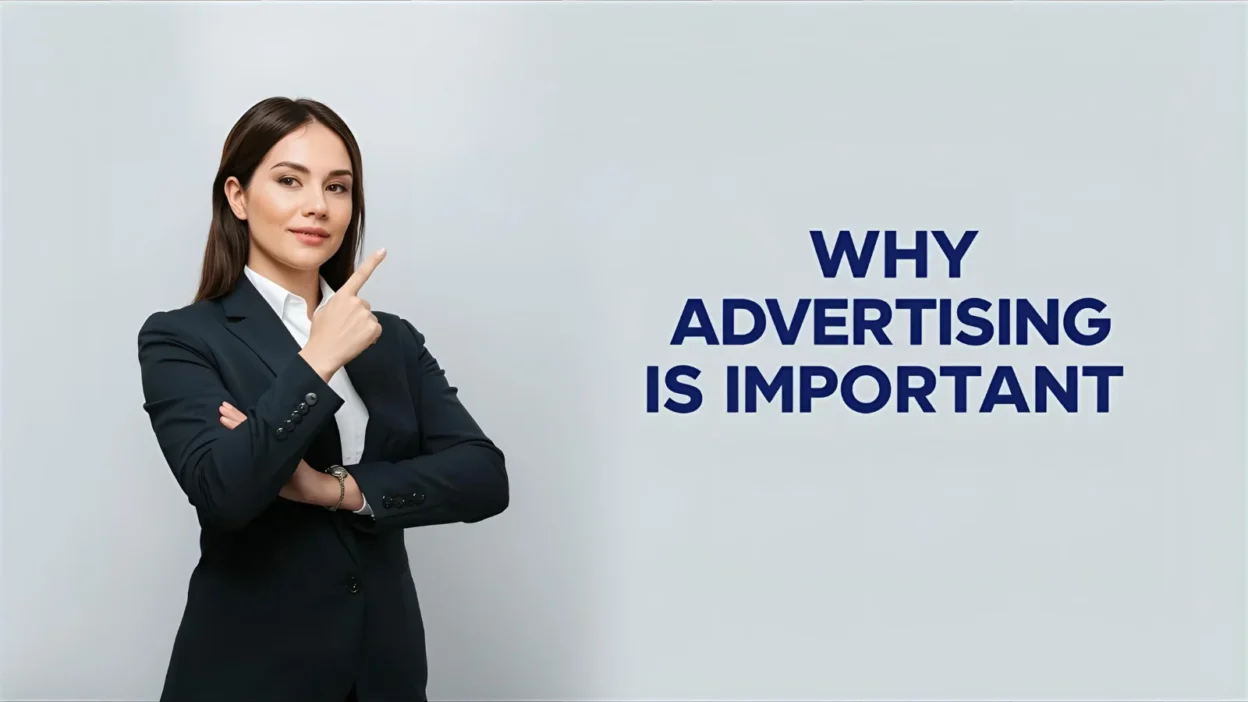Advertising is everywhere—on TV, social media, billboards, magazines, and even inside apps. Some people see it as noise, but in reality, advertising plays a huge role in connecting businesses and consumers. Without advertising, most of us wouldn’t even know about new products, services, or opportunities.
This article explores the many reasons why advertising is important for businesses, consumers, and society.
Understanding Advertising
📌 Definition:
Advertising is a paid communication strategy used by businesses or individuals to promote products, services, or ideas to a target audience.
👉 It’s not just about selling—it’s about building awareness, shaping perceptions, and inspiring action.
Reasons Why Advertising Is Important
- Increases awareness – introduces products, services, and ideas to people.
- Drives sales – motivates customers to make purchases.
- Builds brand image – creates trust, reputation, and recognition.
- Supports competition – encourages better quality and fair pricing.
- Educates consumers – provides information about products, safety, or benefits.
- Boosts the economy – generates demand, jobs, and growth.
- Encourages innovation – pushes companies to improve and stand out.
- Supports media – ads fund newspapers, TV, and online content.
Advertising in Everyday Life
- For businesses – helps attract and retain customers.
- For consumers – makes it easier to compare products.
- For communities – spreads awareness of events, health campaigns, or social issues.
- For governments – campaigns promote safety, education, or national programs.
💡 Example: Anti-smoking ads have saved millions of lives by discouraging harmful habits.
The Psychology of Advertising
Advertising works because it speaks to human emotions:
- Emotion-based ads – use humor, love, or fear to connect.
- Social proof – testimonials and reviews influence decisions.
- Scarcity effect – “limited time offers” create urgency.
- Brand loyalty – consistent advertising builds trust over time.
📖 “Stopping advertising to save money is like stopping your watch to save time.” – Henry Ford
Types of Advertising
- Print – newspapers, magazines, flyers.
- Broadcast – TV, radio.
- Digital – social media, search engine ads, websites.
- Outdoor – billboards, bus ads, posters.
- Influencer marketing – endorsements by public figures.
- Social advertising – campaigns for public awareness.
Idioms About Advertising
- “Word of mouth” – recommendations spread naturally.
- “Sell like hotcakes” – something sells quickly.
- “Catch someone’s eye” – grab attention.
- “Make a name for yourself” – build reputation.
- “Push the envelope” – go beyond limits in creativity.
Synonyms for Advertising
| Synonym | Usage Example |
|---|---|
| Promotion | The company ran a big promotion last week. |
| Marketing | Digital marketing is growing rapidly. |
| Publicity | The film received great publicity before release. |
| Endorsement | Celebrity endorsements boost sales. |
| Campaign | The new campaign targets young buyers. |
Grammar Note: Advertisement vs Advertising
- Advertisement (noun) – a single ad. I saw an advertisement in the paper.
- Advertising (uncountable noun) – the activity. She works in advertising.
- Advert (informal) – common in British English. I like that new TV advert.
👉 Use advertising when talking generally, and advertisement when referring to one specific ad.
Real-Life Examples of Advertising’s Impact
- Coca-Cola’s “Share a Coke” campaign personalized bottles and boosted sales worldwide.
- Nike’s “Just Do It” slogan inspired generations and became part of culture.
- Apple’s product launch ads created anticipation and massive global sales.
- Public health campaigns like “Stop the Spread” educated millions during COVID-19.
Advertising and Society
Advertising isn’t just about buying and selling—it shapes how people think and live:
- Creates awareness – about products, services, and social issues.
- Supports media – TV shows, websites, and newspapers survive on ad revenue.
- Shapes culture – famous slogans become part of everyday language.
- Encourages healthy competition – consumers get better products at fair prices.
🌍 A society without advertising would be uninformed, less connected, and slower to adopt change.
Challenges in Advertising
- Overexposure leading to ad fatigue.
- Misleading or false advertising.
- Privacy concerns with online ads.
- Rising costs for businesses.
⚡ The solution? Ethical, transparent, and creative advertising.
The Future of Advertising
Advertising is evolving with technology:
- AI-driven ads – personalized campaigns for each user.
- Augmented reality ads – interactive experiences in stores or apps.
- Sustainable advertising – eco-friendly campaigns attract conscious consumers.
- Global reach – digital platforms connect businesses with worldwide audiences.
🚀 The future of advertising is smarter, faster, and more engaging.
FAQs About Advertising
Q1: Why is advertising important for business?
It increases awareness, builds reputation, and drives sales.
Q2: How does advertising benefit consumers?
It educates them, helps compare products, and promotes informed decisions.
Q3: Can advertising change society?
Yes—ads raise awareness about health, safety, and social issues.
Q4: Is digital advertising more effective than traditional?
Both have value, but digital offers precise targeting and data.
Q5: Why is creativity important in advertising?
Creative ads grab attention, build memories, and influence decisions.
Conclusion
Advertising isn’t just a business tool—it’s a bridge between ideas and people. It shapes cultures, drives economies, and educates societies. From billboards to social media campaigns, advertising helps brands grow and consumers make better choices.
The biggest reason advertising is important? It connects people with what they need and inspires them to take action.

Sara Taylor is a content writer at Whygenix.com, creating clear, engaging articles that simplify complex ideas, helping readers understand the why behind topics in education, lifestyle, and personal development.




